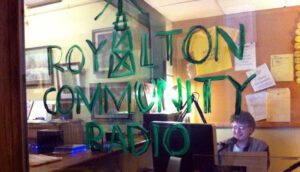
After a week and a half of meetings with over twenty nonprofits ranging from historical societies to downtown revitalization organizations, churches, rotary clubs, human services, agriculture education, and arts and disaster preparedness groups, I am struck by how passionate everyone I met was about their organization and their desire to do better. Over the next year, I will have the opportunity to work with over one hundred such organizations, assisting them in the use of online tools as a way to speed flood recovery, spur economic development, and improve community resilience to disasters. One such organization whose efforts I found particularly innovative is Royalton Community Radio (RCR): an independent, community-based, all volunteer, non-profit station, based in South Royalton, Vermont.
The idea of the radio station grew out of the experience of several locals during Tropical Storm Irene. When Irene hit, parts of the town were cut off from the rest of Vermont, yet the only news coverage that Royalton’s residents could find was from state or national news sources. While Vermont Public Radio offered incredible coverage of the flood from a state-wide perspective, learning what was happening in the immediate Royalton area in real time was next to impossible.
“Wouldn’t it be nice if during an emergency, we had our own community station that could broadcast information?” said Joseph Andriano, founding board member of the station and host of Psy-Fi, a weekly exploration of psychedelic and low-fi rock and pop. “The effort grew out of a desire to have a terrestrial radio signal that in an emergency could broadcast hyper-local information.”
The station launched in March as an online stream, and produces 64 hours of music shows and 6 hours of local public affairs programming each week. By starting as an online, internet-based radio station, the new organization had a jump start on developing content and training volunteers. But to answer the call of being a local resource in times of disaster, the station will be applying for a low power FM license which they hope to receive in the Spring of 2014. At that point the station will need to raise the funds and contract with an engineer to put up a tower.
Even with the license and the equipment, the station needs to develop a local volunteer base, establish themselves as a local source of information, and raise funds to continue operation. Over the next few months, I will be working with the station on several of those challenges. I will be brainstorming with them on how to ensure sustainability once the initial core group of highly involved volunteers moves on, how to use online and offline tools to measure how many people in the White River Valley are currently listening to the radio station, and how to engage the community more in content creation. I will also assist them in the use of online tools to ensure a stable revenue stream once the initial annual memberships run out.
To listen to some great music and public affairs programming produced right here in Vermont, visit royaltonradio.org.
